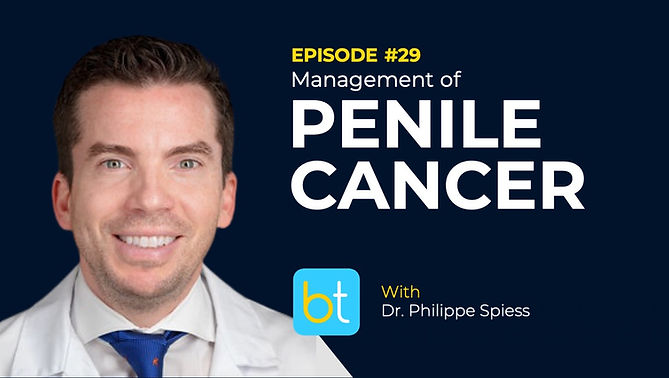BackTable / Urology / Podcast / Episode #29
Management of Penile Cancer
with Dr. Philippe Spiess
Dr. Philippe Spiess from Moffitt Cancer Center discusses surgical and medical management of penile cancer. Listen now to hear more about punch biopsy techniques, surgical resection and lymph node dissection techniques, growing role of topical chemotherapy, importance of multidisciplinary tumor boards.
Be part of the conversation. Put your sponsored messaging on this episode. Learn how.

BackTable, LLC (Producer). (2022, January 26). Ep. 29 – Management of Penile Cancer [Audio podcast]. Retrieved from https://www.backtable.com
Stay Up To Date
Follow:
Subscribe:
Sign Up:
Podcast Contributors
Synopsis
In this episode of BackTable Urology, Dr. Aditya Bagrodia and Dr. Phillipe Spiess from Moffitt Cancer Center discuss surgical and medical management of penile cancer.
When examining a patient for potential penile cancer, it is important to obtain a thorough history to classify the disease and perform a complete physical exam to describe the characteristics of the lesions. Frequently, a biopsy will be performed to confirm the malignancy of the lesion. Dr. Spiess prefers to use topical anesthesia over general anesthesia in his punch biopsies and sends the sample to specialized genitourinary pathologists. Imaging also reveals the presence and extent of metastatic spread of penile cancer. MRI scans are the best way to visualize the inguinal lymph nodes, but PET scans may also be used in multimodal imaging.
Surgical intervention for penile cancer depends on the tumor stage. For T0 tumors, or carcinoma in situ, topical chemotherapy is preferred. However, excision surgery, Mohs surgery, or laser ablation can also be performed for very small lesions. In general, for excision surgeries, urologists should achieve a tumor margin greater than 1 mm and send skin, deep, and urethral margin samples to GU pathology for analysis. For more aggressive and advanced T2/3 tumors, the inguinal lymph nodes should be excised at same time as penile resection in healthy patients. However, if an infected, fungating primary tumor is observed, it should be resected first before lymph node excision. Dr. Spiess recommends that urologists choose the surgical approach that they are most comfortable with performing, whether it be open or robotic. Additionally, the preoperative state of a patient is crucial. Diabetes, nutrition, smoking cessation, and other factors should be optimized to ensure favorable outcomes. Post operatively, surgical staples should stay in until the patient is completely healed, and patients should be encouraged to wear compression stockings.
The effectiveness of radiation therapy depends on the characteristics of individual tumors. Penile cancer tumors are usually radioresistant but radiation has been shown to limit retroperitoneal masses and are effective in shrinking HIV-positive tumors. Generally, radiation therapy provides symptomatic management but is not curative.
The final treatment option discussed was a total or partial penectomy. Total penectomy should only be reserved as the last resort after exhausting other options. Instead, a partial penectomy is preferred, as maximal tissue sparing can maintain feelings of masculinity and gender association and preserve mental health.
Resources
InPACT Trial: https://clinicaltrials.gov/ct2/show/NCT02305654
GSRGT: https://www.gsrgt.com/
The Materials available on BackTable are provided for informational and educational purposes only and are not a substitute for the independent professional judgment of a qualified healthcare professional in diagnosing or treating patients. Any opinions, statements, or views expressed are those of the individual contributors and do not necessarily reflect those of the publisher, platform, or any affiliated organization.














